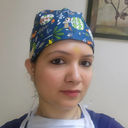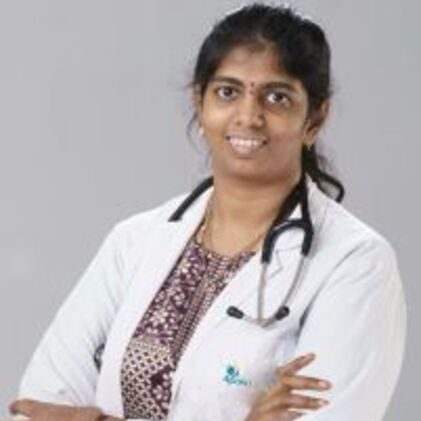Welcome User
Relevance
Best Online Doctors for General & Laparoscopic Surgeon (15 doctors)
Book appointment for a trusted General and Laparoscopic Surgeons in Pune. Check doctor fees, available slots & locations. Apollo 24|7 features some of the top General and Laparoscopic Surgeons in Pune who have experience in treating conditions such as Cysts, Tumors, Appendicitis and more. You can book online consultations & physical doctor appointments via Apollo 24|7. Compare General and Laparoscopic Surgeons fees, experience and more, find a specialist doctor near you. Apollo hospitals has a renowned General & Laparoscopic Surgeon department in Pune.
No doctors available for physical visits. Showing doctors for online consultations only.

Dr. Richa Mishra
General and Laparoscopic Surgeon
8 Years • MBBS, DNB, FISCP
Bengaluru
Apollo Clinic, JP nagar, Bengaluru

Dr. Anusha A
General and Laparoscopic Surgeon
12 Years • MBBS, MS General Surgery
Bengaluru
Apollo Hospitals Bannerghatta Road, Bengaluru

Dr. Shikha Gupta
General and Laparoscopic Surgeon
30 Years • M.B.B.S,M.S.(General Surgery)
New Delhi
CHIKITSA HOSPITAL DIABETES FOUNDATION OF INDIA, New Delhi
Dr. Keerthinmayee
General and Laparoscopic Surgeon
17 Years • M S , General surgery ,FMAS
Tirupati
Suraksha Hospital., Tirupati

Dr. Jahnavi Koneru
General and Laparoscopic Surgeon
7 Years • MBBS ,MS GENERAL SURGERY
Hyderabad
Apollo Clinic, Nizmapet, Hyderabad
Experienced Laparoscopic Surgeon in Pune – Expert Care for Surgical & Minimally Invasive Procedures
Introduction
Find an experienced laparoscopic surgeon in Pune and a trusted general surgeon in Pune for comprehensive surgical care. Whether you search general surgeon near me, laparoscopic surgeon near me, or need a hernia specialist doctor in Pune or piles specialist in Pune, our network lists qualified general & laparoscopic surgeons. These general surgeon doctors provide diagnostic evaluation, minimally invasive procedures, day‑care surgeries and structured post‑operative rehabilitation to help you recover safely and return to daily life sooner.
When Should You Visit a Laparoscopic Surgeon in Pune for Surgical Evaluation?
See a laparoscopic surgeon in Pune for recurrent biliary colic, persistent abdominal pain, a new groin or abdominal lump, unexplained gastrointestinal bleeding or symptoms of appendicitis. If non‑operative care fails, a general surgeon in Pune can determine whether laparoscopic repair is appropriate. Early specialist assessment reduces the risk of emergency complications and improves surgical outcomes.
How a Laparoscopic Surgeon in Pune Helps with Abdominal and Digestive Issues?
A laparoscopic surgeon in Pune evaluates digestive complaints with clinical assessment and targeted investigations, then recommends the most suitable approach - laparoscopic or open. As a general surgeon, they treat gallbladder disease, appendicitis, hernias and other abdominal conditions, explaining benefits of minimally invasive surgery such as less pain and quicker recovery for patients searching general surgeon near me.
Common Problems Like Gallstones, Hernia, and Appendix Infections
Symptomatic gallstones, inguinal and ventral hernias, and acute appendicitis are commonly managed by a hernia specialist and general surgeons in Pune. Timely repair prevents complications like obstruction or strangulation.
When Piles or Fistula Require Surgical Intervention?
When conservative measures fail for haemorrhoids or anal fistula, a piles specialist or piles specialist doctor in Pune evaluates and recommends office procedures or definitive surgery to relieve symptoms and preserve function.
Role of a General and Laparoscopic Surgeon in Day-Care Surgeries
A general and laparoscopic surgeon performs many day‑care procedures - laparoscopic cholecystectomy, diagnostic laparoscopy and selected hernia repairs - allowing same‑day discharge and faster return to routine activities.
What Happens During Your First Consultation with a Laparoscopic Surgeon in Pune?
At the first consultation, the laparoscopic surgeon in Pune reviews your history, examines you and discusses prior tests. The general surgeon doctor will recommend imaging or blood tests, explain likely diagnoses and discuss whether a laparoscopic approach is feasible. If surgery is planned, you’ll receive details on anaesthesia, expected recovery and potential risks, plus pre‑op optimisation advice.
How Does a Laparoscopic Surgeon in Pune Diagnose and Plan for Surgery?
Diagnosis and planning combine clinical findings with imaging - ultrasound, CT or MRI - and lab tests. The laparoscopic surgeon in Pune assesses fitness for anaesthesia and tailors the surgical approach, preparing for port placement and possible conversion to open surgery. Informed consent and perioperative instructions are provided to ensure safety.
Diagnostic Tests and Imaging Used Before Surgery
Ultrasound for gallbladder disease, CT for complex abdominal pathology and blood tests to assess infection or organ function are commonly used by a laparoscopic surgeon in Pune. A top general surgeon in Pune or hernia specialist doctor in Pune will use imaging to plan the optimal repair.
Endoscopy, Ultrasound, and Blood Tests for Accurate Surgical Planning
Endoscopy, ultrasound and blood tests help a laparoscopic surgeon near me and your general surgeon doctor near me confirm diagnosis and plan safe surgery.
Preparing for a Laparoscopic Procedure – Key Pre-Surgery Guidelines
Follow fasting instructions, stop blood‑thinning medications as advised, and arrange transport home. Your laparoscopic surgeon in Pune will provide specific pre‑op guidance.
Post-Diagnostic Counseling by a Laparoscopic Surgeon in Pune
After diagnostics, the laparoscopic surgeon in Pune explains findings, treatment options and recovery expectations so you can make an informed decision.
How Do Laparoscopic Surgeons in Pune Perform and Manage Different Surgeries?
Laparoscopic surgeons in Pune use keyhole techniques - small ports and a camera - to treat gallbladder disease, hernias and appendicitis. The general surgeon in Pune manages perioperative care while the general laparoscopic surgeon focuses on precise technique to reduce pain and wound complications. Postoperative care emphasises early mobilisation, pain control and wound monitoring.
Keyhole Surgery Techniques for Hernia, Gallbladder, and Appendix Conditions
Laparoscopic hernia repair uses mesh placement with minimal tissue trauma; laparoscopic cholecystectomy removes the gallbladder through small incisions; laparoscopic appendectomy treats uncomplicated appendicitis. For recurrent or complex hernias, a hernia specialist in Pune may plan advanced repairs; a piles specialist in Pune coordinates care when anorectal disease coexists.
What Are the Warning Signs That Indicate You Need to See a Laparoscopic Surgeon in Pune?
Seek a laparoscopic surgeon in Pune for severe abdominal pain, fever with abdominal tenderness, sudden groin swelling, persistent vomiting or signs of bowel obstruction. If conservative care fails for chronic hernia discomfort or recurrent biliary colic, consult a general surgeon in Pune or search general surgeon near me for timely evaluation.
What Surgeries and Minimally Invasive Procedures Are Offered by Laparoscopic Surgeons in Pune?
Laparoscopic surgeons in Pune offer cholecystectomy, inguinal and ventral hernia repairs, appendectomy, diagnostic laparoscopy and selected colorectal procedures. Seek a top laparoscopic surgeon in Pune or a general & laparoscopic surgeon who works with multidisciplinary teams. For complex hernia cases, a hernia specialist in Pune provides tailored repair strategies.
Non-Surgical and Conservative Care Options Before Opting for Surgery
Conservative options - dietary modification, analgesics, support garments and topical treatments - are often tried first. A laparoscopic surgeon or general surgeon in Pune will discuss thresholds for surgery and refer to a piles specialist in Pune when intervention is indicated.
Why Choose Apollo 24|7 for Consulting a Laparoscopic Surgeon in Pune?
Apollo 24|7 helps you find verified laparoscopic surgeon in Pune profiles, compare credentials of a top laparoscopic surgeon in Pune, and book appointments with local general surgeon Punes. The platform simplifies booking, pre‑op paperwork and follow‑up scheduling for trusted surgical care.
How to Schedule Consultations and Post-Operative Follow-Ups Online?
Book a visit with a laparoscopic surgeon in Pune or find a laparoscopic surgeon near me on Apollo 24|7 for teleconsults and in‑person follow‑ups. Online scheduling streamlines pre‑op instructions and postoperative check‑ins.
FAQs
Can a Laparoscopic Surgeon Perform Gallbladder or Appendix Surgery Safely?
Yes. A laparoscopic surgeon in Pune routinely performs these procedures with low complication rates and faster recovery.
How Is a Laparoscopic Surgeon Different from a General Surgeon?
A general surgeon in Pune manages a wide range of surgical problems; a general laparoscopic surgeon specialises in keyhole techniques and selects the best approach for each patient.
How Long Is the Recovery Period After a Laparoscopic Surgery?
Recovery is generally quicker - many patients resume light activities within days and return to work in one to two weeks depending on the procedure.
What Is the Average Cost of Laparoscopic Surgery in Pune?
Costs vary by procedure, hospital and surgeon; consult a laparoscopic surgeon in Pune or search general surgeon near me for estimates.
Can a Laparoscopic Surgeon Also Treat Hernia and Piles Cases?
Yes. Many hernia specialist in Punes and piles specialist in Punes are trained in both laparoscopic and open techniques.
Do Laparoscopic Surgeons Offer Day-Care or Same-Day Surgery Options?
Yes. Selected procedures may be offered as day‑care by a general surgeon in Pune or a top laparoscopic surgeon in Pune.
How Soon Can I Return to Work After a Laparoscopic Procedure?
Desk work often resumes within a week; physically demanding jobs may require two to four weeks - confirm with your surgeon.
What Safety Measures Are Taken During Laparoscopic Surgeries?
Strict pre‑op assessment, sterile technique, intraoperative monitoring and contingency plans for conversion to open surgery ensure safety.
Can I Visit a General Surgery Doctor or Hernia Doctor Near Me for an Opinion?
Yes. A General Surgery doctor or Hernia doctor near me can provide an initial opinion and order diagnostics.
Can a Surgery Doctor Near Me Help with Hernia or Piles Evaluation?
Yes. A Surgery doctor near me or Hernia doctor can evaluate symptoms and recommend conservative or surgical options.